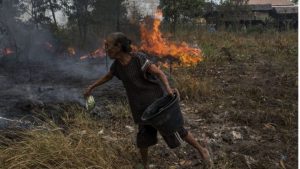My perspective on global warming has shifted from individualistic to holistic. Before this course, I thought that if all humans made individual sustainable choices, those choices would form a sustainable system. What I failed to realize is how many public resources we use without acknowledgement, such as roads, public buildings (hospitals, libraries, supermarkets, malls, etc.), and public parks. I use these community resources daily, but I have no idea how many resources am I actually consuming. I now realize that the web of climate change cannot be altered by removing a single strand; it is policy changes that will make a difference.
The statistics on global warming are staggering. For example, droughts in Afghanistan are causing farmers to turn to the illegal opium industry because poppies grow well in arid conditions (Parenti 2). In Northern India, changing weather patterns, such as the time and intensity of monsoons, are forcing farmers to turn to the government for food (Wapner 2). In Syria, a devastating drought led to the beginning of the civil war; one million people were displaced and two million were forced into extreme poverty (“Years of Living Dangerously”). Indonesia is covered in a thick fog due to the burning of vast areas of jungle and peat to keep up with the global market’s demand for palm oil (“Years of Living Dangerously”). Burning forests in Indonesia currently release more carbon dioxide per day than all the economic activity in the United States (Indonesia’s Fire Outbreaks). While there is no way to face these issues on an individual level, if policies are implemented that subsidize crops resilient to droughts and heavy rainfall, support maintenance of irrigation systems, and strictly regulate exports of global trade, we could begin to make changes that would affect millions and protect our environment.

A woman pours water from a small bowl in an attempt to fight a forest fire in Indonesia. Many of these fires are started by palm tree farmers clearing the land, but soon become out of control and cover the land in a thick smog. http://www.bbc.com/news/business-35109393
